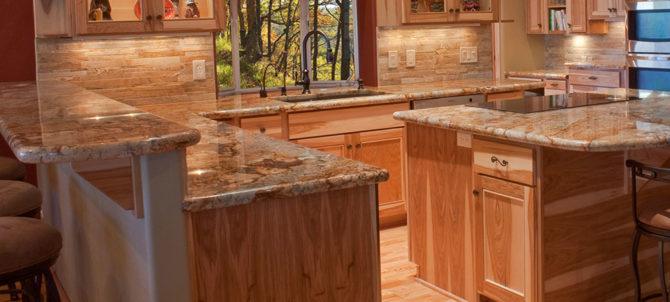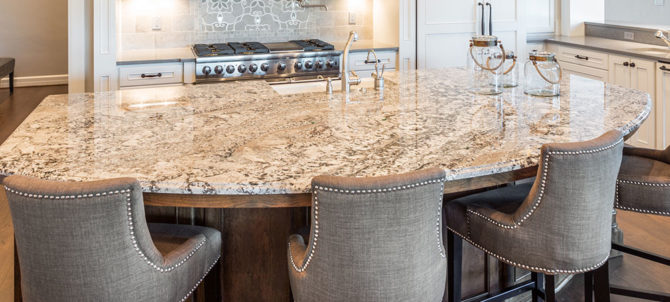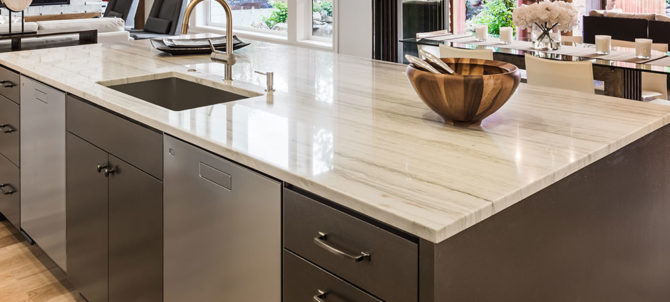
In many ways, yes. While both are stone countertops, there are significant variations between quartz and granite. Granite countertops are porous and absorb liquids.
This makes them far more susceptible to stains than quartz, which is nonporous because of its manufacturing process.
On the other hand, granite is far more heat resistant than quartz. Hot pans can be placed directly on granite counters; however, hot pads or trivets are recommended for quartz worktops.
There is also long-term maintenance to consider. Granite needs to be resealed on a regular basis to prevent stains and other damage.
This entails applying a resealing substance to the surface. Quartz requires no similar long-term upkeep. While quartz cleaning supplies are commercially available, you can simply use warm water and soap.
If you’re transitioning from granite to quartz countertops—or vice versa—it’s critical to understand the fundamental differences between the two. Both have individual advantages and limitations, but there is no doubt that, overall, quartz is easier to maintain and care for.
How do you maintain quartz countertops?
While quartz is easy to maintain, it doesn’t mean you should mishandle it. You still need to take good care of it. To help you out, here are ways to maintain your quartz.
Watch the materials you use to clean the surfaces.
You should not expose quartz countertops to harsh chemicals since they can damage the surface. Avoid using bleach, oven cleaners, or any other cleaning products that contain pumice. Also, do not clean the surface with furniture polish, paint removers, silver cleaners, or oil soaps.
You should avoid using any of the following cleaning agents on your quartz countertops:
– Acid-based cleaning products.
– Alkaline cleaning products
– Products for removing nail polish and cleaning granite countertops.
– Bleach or bleach-based cleansers for ovens and stainless steel.
There are many more chemicals that can damage your quartz. As a general rule, if the packaging does not state that the product is suitable for quartz use, avoid using it on your countertop.
Don’t cut directly on the countertops.
Avoid using knives directly on quartz countertops as they are not scratch-resistant. When you put sharp objects on a countertop, you risk damaging it. Instead of sharp, abrasive objects, use a soft cloth.
Your quartz should withstand accidental knife cuts and fallen objects. However, you should make this an exception rather than the rule.
When slicing fruits or vegetables, continue to use a cutting board and avoid slamming things down onto the tabletop surface. Remember that excessive force or pressure on the surface might cause cracks or chips in the stone. And you don’t want this.
In most circumstances, cutlery will not harm the quartz as is one of the toughest stones available. However, it may damage the protective resin layer, leaving a mark so be gentle with them.
You should note that quartz knives will most certainly destroy the countertops, causing them to dull rapidly. So, avoid using them.
Take care not to stain the countertops.
No homeowner is perfect, and if you spend a lot of time cooking in your kitchen, there will be an inadvertent spill at some point. The good news is that quartz is relatively resistant to most types of stains. When discoloration occurs, you can easily remove it.
While this is the case, you should note that different types of foods may produce different results. Here’s a quick list of the most prevalent stains on quartz surfaces that you should keep a close eye on.
Spices: Colorful spices such as curry, turmeric, paprika, and chili powder can stain your countertop. Unfortunately, these are some of the most regularly spilled items while making dinner.
The good news is that the majority of this discoloration occurs on the surface. Wipe away spilled curry stains with a moist rag, and apply dish soap if necessary.
Food coloring: As a literal dye, it can discolor your quartz momentarily. You should exercise caution when using food coloring in the kitchen; wherever possible, apply food coloring to your plate while standing over the sink. If you spill food coloring on your quartz, clean it up as quickly as possible.
Tomato Sauces: As any household with discolored Tupperware knows, the combination of acidity and color in tomatoes may cause permanent stains.
If you spill tomato or chili sauce on your counters, clean it up as quickly as possible.
Keep the markers away.
Keep permanent markers away from quartz countertops. The marks can disfigure the surface, which is difficult to clear. If you see a persistent ink stain on your countertop, you should first utilize normal cleaning to remove the contaminant.
If the discoloration persists, saturate a cloth with glue remover and rub it into the stone. Make sure to thoroughly rinse the countertop with warm water to remove any cleaner residue.
Don’t place hot objects directly on the countertops
As much as quartz is tough, you should keep in mind that it is not as heat-resistant as granite countertops. If you want to save the quartz countertop’s original look, avoid placing hot things on it.
Placing a roasting pan or hot skillet directly on the surface may cause damage to the countertop.
Thermal shocks can cause cracks to grow on the surface. To protect the surface, use hot pads and trivets.
Parting shot
These are some of the ways to keep your countertops in top shape. Quartz countertops Durham, unlike granite, are not porous. This means you can clean the surface with the traditional soap and water solution.
Begin by removing any items on top of your countertop, such as appliances, cookbooks, and utensil holders. Then, using a spray bottle, clean the countertop with a mixture of dish soap and water. Dish soap is a degreaser that can assist in removing stuck-on particles.
Besides this, you should avoid placing any hot objects on the countertops as they will cause damage.

